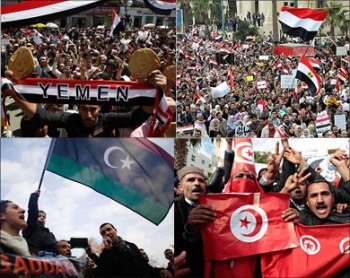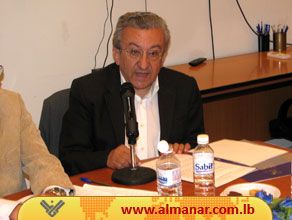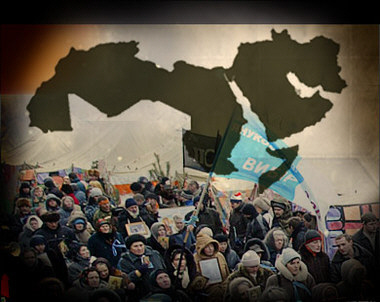Arab world witnesses today a historical transitional period, where moving backward turns to be almost impossible.
 Arab world witnesses today a historical transitional period, where moving backward turns to be almost impossible. However, this optimistic view seems to be incomplete, for it blacks out the regional conflict, the attempts of counter revolution and efforts of arrogant superiority led by Great Powers.
Arab world witnesses today a historical transitional period, where moving backward turns to be almost impossible. However, this optimistic view seems to be incomplete, for it blacks out the regional conflict, the attempts of counter revolution and efforts of arrogant superiority led by Great Powers.
Each pure Arabic individual hopes that ongoing revolutions and intifadas won’t end up with another setback, particularly amid projects of dividing the Arab world which are still a serious goal for American-Zionist plans, like the case in Libya, Iraq, Syria and other Arab countries.
The widespread chaos and emergence of Takfiri powers witnessed today, increase concerns over the freedom and national uprising. For this, Arab world faces the birth of one of the next two transformations: either a new Arab world that puts the basis of an Arab revival and integrated Arab relations, or reorganizing the Arab world on the basis of forming sectarian entities, where new Sikes-Picot seems to be possible regarding the eventual events.
In this regard, editor in chief of the Lebanese Transformation Magazine, Sarkis Abo-Zeid, believes there is no doubt that the ‘Arab Nation State’ faces today a fateful situation, which we couldn’t be certain that if it will turn positively to be an ’uprising’ as long as there will be possibility to be dragged towards division, especially amid the absence of national and patriotic powers capable of protecting the Arab revolutionary achievements.
 During the “Future Horizons of Egyptian Revolution” seminar held at Baheth Center for Palestinian and Strategic Studies in Beirut Thursday, Sarkis pointed out that “in this stage, we must deal with internal obstacles, i.e. tribal and sectarian formations, and tools of western control which seek to maintain the region as a point of tyranny that belongs to the ancient world, in addition to the Israeli element, chaos and division projects.”
During the “Future Horizons of Egyptian Revolution” seminar held at Baheth Center for Palestinian and Strategic Studies in Beirut Thursday, Sarkis pointed out that “in this stage, we must deal with internal obstacles, i.e. tribal and sectarian formations, and tools of western control which seek to maintain the region as a point of tyranny that belongs to the ancient world, in addition to the Israeli element, chaos and division projects.”
“All those factors might not only maintain the status quo, but distort the Arab revolution from its positive course towards more dependency as well, in order to ensure Israel’s security and more western dominance, via division, periodical strifes, chaos, and continuous civil wars,” Sarkis added.
Such facts, Sarkis believed, require looking forward cautiously at the transitional phase to unfold the conflict’s reality, and to measure the capacity of emerging transformative Arab powers to have its own will and vision, in order to accomplish its revolutionary missions under a new regime capable of protecting its local and regional achievements.
“Every revolution is measured by its ability to establish a new system and make changes within the regime structure, without being just a movement or reaction,” Sarkis added.
 For all the reasons mentioned above, moving backward becomes a possibility which cannot be excluded, because the conflict’s course has no inevitable trend, but there is always an opportunity to change and progress.
For all the reasons mentioned above, moving backward becomes a possibility which cannot be excluded, because the conflict’s course has no inevitable trend, but there is always an opportunity to change and progress.
In this regard, Sarkis noted that “January 25th Egyptian revolution constitutes a physical and psychological combination, carried out by different classes of the society, against a regime collaborating with Israel and USA, and allied with an exploiting and oppressive class of capitalists, security men and entourage of relatives.”
From this point, studying the Arab individual movement today within certain settings is what really required in order to recognize motives of his anger, his revolution and the mechanism of his consciousness transformation into an executive element.
According to Sarkis, there are three integrated factors through which we can evaluate the Arab uprising, despite the variety of countries facing the same popular situation. Those factors starts by “(1) resisting the US-Israeli project of dominance, (2) achieving unity of the community and rejecting all forms of division and chaos, and (3) building a new civil democratic resisting regime, which materializes the equality, justice and renaissance.”
In short, Arab world needs to live another renaissance these days. Once those three factors become integrated, the promised regime will be built; otherwise, chaos will be the only alternative.
